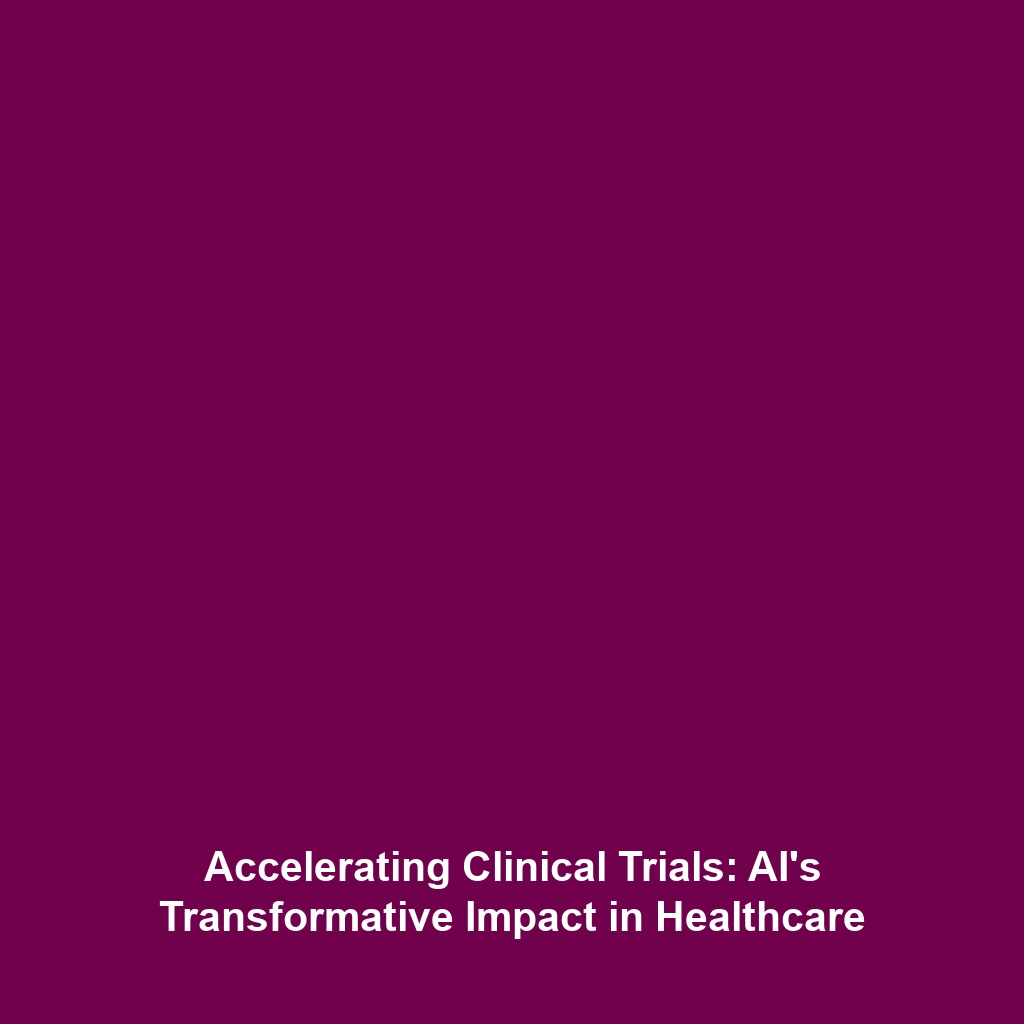Real-World Examples of AI’s Impact on Speeding Up Clinical Trials
Introduction
The integration of Artificial Intelligence (AI) in healthcare is transforming numerous processes, particularly clinical trials. By harnessing advanced algorithms and data analysis, AI is significantly expediting the entire trial process, resulting in faster delivery of medical treatments to patients. This article explores real-world examples of AI’s impact on speeding up clinical trials, providing insights into its significance within the broader context of AI in Healthcare. With the rising demands for efficient healthcare solutions, understanding these advancements is essential for stakeholders across the medical field.
Key Concepts
The role of AI in enhancing clinical trials can be understood through several key principles:
- Data Analysis: AI algorithms rapidly analyze large datasets, identifying eligible participants and predicting outcomes.
- Patient Recruitment: AI tools streamline the recruitment process by utilizing predictive analytics to match patients with trials more effectively.
- Real-Time Monitoring: AI enables continuous monitoring of trial subjects, thereby improving safety and compliance.
These principles highlight the integration of AI technologies, including machine learning and natural language processing, in accelerating the clinical trial framework, showcasing the transformative potential of AI in healthcare.
Applications and Real-World Uses
Here are some practical examples that illustrate how real-world examples of AI’s impact on speeding up clinical trials manifest in the field of AI in Healthcare:
- IBM Watson: The IBM Watson platform aids in patient matching by analyzing medical records and literature, thus expediting recruitment for cancer clinical trials.
- Trials.ai: This startup uses AI to optimize clinical trial protocols, reducing the time it takes to design and launch new trials.
- Antidote: An AI-driven platform that connects patients with clinical trials by analyzing databases to find appropriate matches based on personal health data.
These applications underscore the evolving landscape of clinical trials, showcasing the practical uses of AI in healthcare environments.
Current Challenges
Despite the promising advancements, there are several challenges of AI’s impact on speeding up clinical trials:
- Data Privacy: Ensuring patient confidentiality while utilizing large datasets poses significant ethical concerns.
- Integration: Many healthcare systems lack the infrastructure to integrate AI technologies effectively.
- Bias in Data: AI algorithms trained on biased datasets can lead to skewed results in clinical trials.
These challenges highlight the ongoing issues in AI in Healthcare that must be addressed to maximize the efficacy of AI applications in clinical trials.
Future Research and Innovations
Looking ahead, several innovations are set to shape the future of real-world examples of AI’s impact on speeding up clinical trials. Key developments include:
- Next-Gen Machine Learning: Enhanced algorithms capable of learning from smaller datasets could streamline patient onboarding and operational efficiency.
- Blockchain Technology: Utilizing blockchain for secure data sharing can alleviate privacy concerns while fostering trust in AI-driven trials.
- Wearable Technology: Integrating wearables can provide real-time health data, significantly impacting trial monitoring and patient engagement.
These innovations are poised to redefine trial methodologies, contributing to faster and more efficient healthcare solutions.
Conclusion
In conclusion, the real-world examples of AI’s impact on speeding up clinical trials underscore the transformative nature of AI in healthcare. Through enhanced data analysis, patient recruitment, and real-time monitoring, AI continues to reshape the clinical landscape. As challenges persist, future research and innovations promise to further expedite clinical trial processes, leading to improved patient outcomes. To learn more about the intersection of technology and healthcare, explore our related articles on AI in Healthcare and Clinical Research Innovations.

